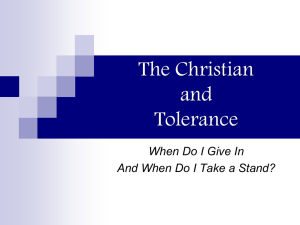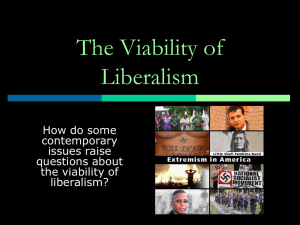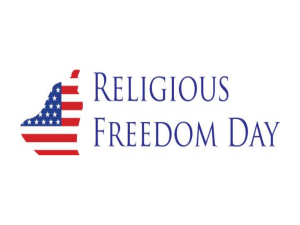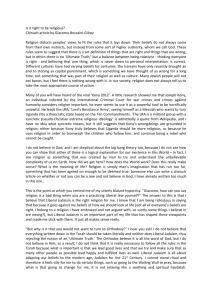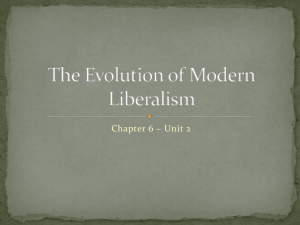The Tolerant Society and its Enemies: Moral Relativism and
advertisement
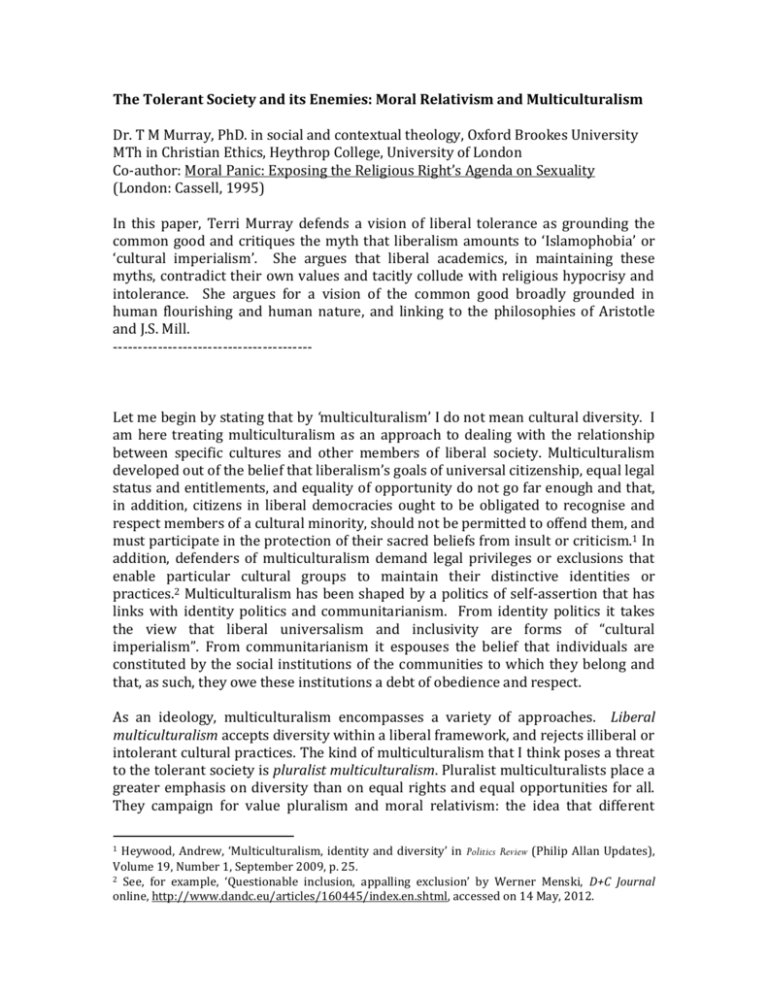
The Tolerant Society and its Enemies: Moral Relativism and Multiculturalism Dr. T M Murray, PhD. in social and contextual theology, Oxford Brookes University MTh in Christian Ethics, Heythrop College, University of London Co-author: Moral Panic: Exposing the Religious Right’s Agenda on Sexuality (London: Cassell, 1995) In this paper, Terri Murray defends a vision of liberal tolerance as grounding the common good and critiques the myth that liberalism amounts to ‘Islamophobia’ or ‘cultural imperialism’. She argues that liberal academics, in maintaining these myths, contradict their own values and tacitly collude with religious hypocrisy and intolerance. She argues for a vision of the common good broadly grounded in human flourishing and human nature, and linking to the philosophies of Aristotle and J.S. Mill. ---------------------------------------- Let me begin by stating that by ‘multiculturalism’ I do not mean cultural diversity. I am here treating multiculturalism as an approach to dealing with the relationship between specific cultures and other members of liberal society. Multiculturalism developed out of the belief that liberalism’s goals of universal citizenship, equal legal status and entitlements, and equality of opportunity do not go far enough and that, in addition, citizens in liberal democracies ought to be obligated to recognise and respect members of a cultural minority, should not be permitted to offend them, and must participate in the protection of their sacred beliefs from insult or criticism.1 In addition, defenders of multiculturalism demand legal privileges or exclusions that enable particular cultural groups to maintain their distinctive identities or practices.2 Multiculturalism has been shaped by a politics of self-assertion that has links with identity politics and communitarianism. From identity politics it takes the view that liberal universalism and inclusivity are forms of “cultural imperialism”. From communitarianism it espouses the belief that individuals are constituted by the social institutions of the communities to which they belong and that, as such, they owe these institutions a debt of obedience and respect. As an ideology, multiculturalism encompasses a variety of approaches. Liberal multiculturalism accepts diversity within a liberal framework, and rejects illiberal or intolerant cultural practices. The kind of multiculturalism that I think poses a threat to the tolerant society is pluralist multiculturalism. Pluralist multiculturalists place a greater emphasis on diversity than on equal rights and equal opportunities for all. They campaign for value pluralism and moral relativism: the idea that different Heywood, Andrew, ‘Multiculturalism, identity and diversity’ in Politics Review (Philip Allan Updates), Volume 19, Number 1, September 2009, p. 25. 2 See, for example, ‘Questionable inclusion, appalling exclusion’ by Werner Menski, D+C Journal online, http://www.dandc.eu/articles/160445/index.en.shtml, accessed on 14 May, 2012. 1 moral beliefs (both those that respect autonomy and liberty and theocratic, fundamentalist or secular authoritarian ideologies that do not) are equally legitimate. *** I want to offer a few reasons for why I think liberalism, as a political philosophy, is still relevant, and then I will briefly state why I think liberal multiculturalism is preferable to pluralist multiculturalism as a framework within which disputes about the common good can best be resolved. The liberal state is designed to protect the citizen from both external threats and from itself, and from internal threats that can arise from a tyranny of the majority. The pursuit of values that constitutes the moral life is not possible where said “values” are coerced. Values, by definition, require conviction, not coercion. Those who reject self-determination for others invariably want it for themselves. Arguably, freedom to pursue goals that are genuinely one’s own is a necessary condition for human flourishing. In the third chapter of ‘On Liberty’, John Stuart Mill (1806 – 1873) identified individuality as “quite the chief ingredient of individual and social progress”3 and wrote that the free development of individuality is “one of the leading essentials of well-being.”4 Mill claimed that where a person’s “rule of conduct” came not from within but from slavish obedience to “the traditions or customs of other people” a principal ingredient of happiness would be lacking. 5 Mill was not opposed to conformity when it is an informed choice. But he did oppose blindly following custom, for example when the “grounds of an opinion are not conclusive to the person’s own reason” or where the “inducements to an act are not such as are consentaneous to his own feelings and character”.6 In these circumstances, conformity only weakens the faculties of perception, judgment, discriminative feeling, mental activity, and even moral preference. Ultimately, such “ape-like imitation” leads to the atrophy of the highest and best in individuals and prevents the full development of the human person.7 Mill’s understanding of what constitutes human well-being draws strikingly on virtue theory.8 In Chapter 4 of the Nicomachean Ethics Aristotle identifies happiness (eudaimonia) as the good for which all humans strive. By ‘eudaimonia’, Aristotle is not referring to a state of psychological euphoria, nor to a passive set of abstract ideas about ‘humanity’, but to the activity of the soul in accordance with reason. Their understanding of virtue is similar that of Aristotle, who maintained that human beings are uniquely capable of living according to the faculty of reason. In 3 See Stefan Collini, Ed., On Liberty and Other Writings, Cambridge University Press, 1989, p. 57. Ibid. 5 Ibid., pp. 58-9. 6 Ibid., p. 59. 7 Ibid., p. 59 8 Erica Stonestreet, ‘On Individuality’ in Philosophy Now magazine, November/December 2009, Issue 76, p. 17. 4 Chapter 8 of the Nicomachean Ethics, he identifies the good of the soul as higher than worldly goods and goods of the body. While all three are needed for complete happiness, Aristotle maintains that neither worldly goods nor goods of the body can alone bring happiness. Happiness is an activity of the soul and the happy person leads a good life. In Chapter 9, Aristotle acknowledges that while virtue is a necessary condition for happiness it is not a sufficient condition. Adversity and misfortune can prevent the virtuous person for attaining happiness. Nevertheless, without virtue, a person cannot achieve the true well-being of which humans are capable. Both Mill and his predecessor William Von Humboldt worried that the idea of virtue as a good in itself would be supplanted by the notion that virtue is instrumental to procuring a more immediate, hedonistic conception of happiness involving the pursuit of physical and material goods.9 Happiness so conceived cannot be secured for all. Mill’s rejection of the psychological notion of happiness separates his utilitarianism from the more crude understanding of utility as “the greatest good for the greatest number”. For Mill and Humboldt, actively participating in shaping one’s own desires and impulses, as opposed to passively responding to a generic set of “given” desires and impulses, is what it means to have character and to express one’s nature. When happiness is understood as a self-authored state of well-being, then the pursuit of happiness becomes cooperative rather than competitive. No institution or government can confer moral virtue upon a human being or make her a person of good moral character. Happiness, conceived in the ethically serious sense as a life well-lived, cannot be secured by governments or laws, whether secular or theocratic. However, it is within the power of governments and social institutions to provide human beings with the external conditions indispensable to the pursuit of this kind of individual development. This will not secure the attainment of virtue or happiness, but it will ensure that all have the means necessary to its attainment. Liberals and virtue ethicists alike reject the notion that an individual’s eudaimonia could be provided by others. As such, the absence of harm and interference are more essential to an individual’s well-being than goods bestowed by others could ever be.10 9 Erica Stonestreet, ‘On Individuality’ in Philosophy Now magazine, November/December 2009, Issue 76, p. 17. 10 Mill argued that individuality and tolerance, along with minimal state interference, produce the best situation for human flourishing. Mill observed that governments and religious authorities are not infallible. Censoring lifestyles or viewpoints on the basis of their difference from our own would be to assume an infallibility that does not exist. He also argued that social progress is aided by openness to a wide variety of views. Even mistaken views can contain partial truths, and so should be given a hearing. The legitimacy of society’s dominant beliefs rests upon their being tested from time to time against the merits of alternative arguments and perspectives. These challenges present an Mill argued that the individuality that constitutes self-determination is essential because the wisdom of others is fallible and sometimes too narrow. Individuals know and care more about their own situation more than anyone else who might claim to be acting in “their best interests”. Liberalism, uniquely it seems to me, embodies (not only in word but in law) the belief that human beings are worthy of liberty, responsibility and self-determination. If we open the door to ideologies that colonize the individual’s negative liberty by the will of others acting in her ‘best interests’ or “God’s”, we will remove from individuals both the liberty and the responsibility essential to living a good life. *** In anticipation of my (both liberal and non-liberal) critics, I would now like to say a few words in defense of liberalism and liberal multiculturalism. There can be no doubt that, where liberalism has espoused unfettered capitalism, it certainly is competitive and not cooperative. However, liberalism is fragmented from within, most notably in the economic sphere, where there is a gulf between classic liberalism and welfare liberalism. The former seems to have morphed into a neo-conservative hybrid creature that hates state intrusion into private wealth but loves inserting its tentacles into every other private crevice (quite literally!) of individual’s lives. It is no secret that, in modern democratic societies, the mass media is effectively in the hands of an oligarchy. This means that the voices of the elites who own the media set the cultural agenda and drown out alternative voices. In today’s liberal democracies, who pays the piper calls the tunes and so profit and freedom of thought are often opposed. The ‘freedom’ of capitalist liberal democracies is arguably the freedom to make profit – not the freedom of individuals.11 These criticisms provide good arguments for regulating the markets, raising taxes for the super-rich, revising international trade agreements, and enforcing tough laws on multinational corporations. Applying the harm principle to corporations and nation states decades ago, before they grew onto enormous tails that today wag the dog, could have prevented many of the economic inequities that now exist. While these proposals may sound idealistic at this late stage of the game, the alternative is a cynical abandonment of politics, and resignation to the fact that we opportunity for the dominant beliefs to improve, not a threat. Challenges to the dominant beliefs also ensure that the dominant views will not be held in the manner of a prejudice, but rather that the reasons for holding them will be understood. This will ensure that those who cherish these beliefs are truly convicted, not just clinging to a set of “dead dogmas”. 11 Grant Bartley, ‘Knowledge & History’ in Philosophy Now magazine, November/December 2009, Issue 76, p. 21. now live in a post-political world where only might ever makes right. The fact that some have failed (either by accident or by design) to adhere to the principles of political liberalism in practice is not a reason to abandon political liberalism’s principles. It is a reason to work harder to make sure that its principles are better applied, enforced and preserved in the future. Western liberal universalism has its counterpart in political Islam (or PanIslamism), which presents a rival universalism to western liberalism in the form of an ahistorical and supranational “Islam” devoid of internal diversity or contextualisation.12 This generic Islam, with its mythical socio-cultural unity of the ummah13, is integral to Islamists’ self-perception and not a fabrication of their most obtuse Western detractors. However, cultures are not homogeneous but complex. The idea that loose groupings of individuals with similar religion, backgrounds or language constitutes ‘culture’ rests on the assumption that all of the diverse individuals within that grouping belong to the same ‘community’. The notion of a “Muslim community” assumes a broad consensus on Muslim beliefs or practices. This is a political fiction. Moreover, culture, where it is used to promote social cohesion by (over)emphasizing a particular aspect of identity, such as religious background, is often a form of oppression or captivity. Part of the definition of ‘culture’ is socialization. Where this socialization is not based on free and informed choice, it is little more than indoctrination. As such, it amounts to an assault on individuality and self-determination, and becomes a form of tyranny. Female (and male) feminists14 argue that multiculturalism is often little more than a concealed effort to enforce male power.15 The cultural beliefs it seeks to preserve, See Stephen Howe, ‘Aftershock’ in The New Humanist, Sept/Oct 2011, Vol. 126, No. 5. Howe writes: “ …Islamism evidently functions in many arts of the world as a form of -- or perhaps surrogate for – cultural nationalism, the central thrust of the ideology is determinedly anti-nationalist, decreeing loyalties far more inclusive and compelling than any more localised identity-claim.” (p. 28) In my view, the same could arguably be said of Catholicism. 13 In the context of Pan-Islamism, the word ummah is used to mean the diaspora or Commonwealth of the Believers (ummat al-mu'minin), and thus the whole Muslim world. 14 I am not assuming that the west has a monopoly of ‘feminism’. 15 See, for example, Jan Feldman, Citizenship, Faith and Feminism: Jewish and Muslim Women Reclaim their Rights,, Brandeis University Press, Waltham, Mass, 2011. Feldman concludes this book with a reminder that the “adverse effect of a policy of multicultural accommodation that unwittingly entrenches male power within religions and cultures applies in the international realm, as well. Internationally, organizations like the UN are squarely behind women’s rights and gender equality. Nonetheless, the UN has made it a “right” to have one’s culture recognized, respected and preserved. Not surprisingly, as is the case at the national level, men speak for minority cultures and claim to represent their “authentic” values. Moreover, the United Nations and the international human rights regime are relatively impotent in the face of respect for national sovereignty. Unless national governments put forward women-friendly domestic legislation and allocate funds for adjudication and enforcement of these provisions, international treaties and documents remain mere paper.” (p. 197) 12 maintain or extend are all too often deeply patriarchal. The politics of cultural recognition become the legitimating narrative for continued female subordination. Pluralist multiculturalism separates cultural identity from political/national identity, and emphasises the differences between them. As such, it is essentially at odds with the political rule of nation states. Liberal democracies are nation states that provide the basis for democratic political rule. Pluralist multiculturalists divide their loyalties between culture and the broader political community made up by the host nation, often giving more allegiance to the sub-culture’s values, which may be essentially incongruous with the laws that govern the nation state. Finally, the politics of cultural recognition and assertion undermines the idea of a common humanity, limiting people’s sense of moral responsibility to members of their own community.16 This leads to moral relativism and the rejection of universal human rights.17 To identify an emphasis on individuality, negative liberty and self-determination as essentially ‘Western’ concerns, alien to non-European cultures, is to deny the main thrust of anti-Colonial politics. Even robust criticisms of liberal values and lifestyles trade in liberalism’s currency of free expression - a currency that their own cultural spokespeople deny to their detractors.18 The laws in liberal democracies reflect widely accepted norms about the freedoms necessary for human beings to flourish (many of which are also inscribed in documents such as The European Convention on Human Rights and The Universal Declaration of Human Rights19). Given the wide-ranging international support for such documents, it would be misleading to describe them as symptomatic of a “western” view or of “cultural imperialism”. The following countries voted in favor of the Declaration: Afghanistan, Argentina, Australia, Belgium, Bolivia, Brazil, Burma, Canada, Chile, China, Colombia, Costa Rica, Cuba, Denmark, the Dominican Republic, Ecuador, 16 Following a conference on humanitarian law and Islamic law which took place in Islamabad in 2005, journalist Hadia Nusrat summarized the findings of the legal experts with this caveat: “Despite its many overlaps with the Islamic law, Muslim scholars maintained that [International Humanitarian Law] is a man-made law and only acceptable to Muslims so long as it does not conflict with the Shari’a. Islamic law has greater primacy for Muslims as it is a matter of their faith that allows no room for deviation.” See: ‘Humanitarian Law and Islam’, The Magazine of the International Red Cross and Red Crescent Movement, http://www.redcross.int/EN/mag/magazine2005_1/24-25.html, Accessed on 12 May, 2012. 17 Incidentally, Cyrus the Great, founder of the Persian Achaemenid dynasty (550–329 BC) is said to have issued the first recorded written declaration of human rights. The so-called ‘Cyrus Cylinder’ is held by the British Museum. 18 Islamic spokespeople’s responses to apostasy, for example, vary. In many cases rejection of Islam by Muslims is seen as a punishable offense that would incur execution or, in other cases, fatwa. Hizbut-Tahrir’s draft Constitution, Article 7 c. states that any Muslim who changes their mind about their religion should be killed. Other prominent cases that highlight the extreme response to criticism or satire of Islam are the attack by Mohamed Geele on Danish editorial cartoonist Kurt Westergaard following the publication of his cartoons in the Danish newspaper Jyllands-Posten and the 2004 murder of Theo Van Gogh, the Dutch journalist with whom Ayaan Hirsi Ali made a film about women and Islam. 19 Freedoms claimed in this document include, but are not limited to, “freedom of speech and belief and freedom from fear and want” and “freedom to change [one’s] religion or belief”. Egypt, El Salvador, Ethiopia, France, Greece, Guatemala, Haiti, Iceland, India, Iran, Iraq, Lebanon, Liberia, Luxembourg, Mexico, Netherlands, New Zealand, Nicaragua, Norway, Pakistan, Panama, Paraguay, Peru, Philippines, Thailand, Sweden, Syria, Turkey, United Kingdom, United States, Uruguay and Venezuela. *** The Paradox of Tolerance “Should a liberal society tolerate a minority culture that doesn’t respect its values?” Suppose the intolerant minority rejects dissent within its own ranks. Leaders of this community refuse to acknowledge that other points of view – whether internal or external - could be true. If such a community were to grow and become the majority, it would establish legal and social sanctions against those who dissent from its doctrines or teachings. We would not increase autonomy by being tolerant towards such a community. As the intolerant community grows, our tolerance would have contributed to a decrease in tolerance in the society at large. On the other hand, it could be argued that being part of a conservative culture can be an expression of autonomy, of living as one thinks best. Liberals defend the right of individuals to live as they think best, within the limits of the harm principle. It would be contradictory for a liberal to advocate for ‘experiments in living’ and then say, “unless you choose a way of living that liberals disagree with.” However, the beliefs and values (but not all of the practices) of the intolerant/conservative culture can be tolerated without contradiction. Since the host society is liberal, individuals will have certain rights that protect their negative liberty to pursue their own good in their own way. However, if the intolerant subculture’s practices violate the Harm Principle, for example, by using violence against members of the community who dissent, then a liberal society cannot tolerate those practices. This does not mean that tolerance is impossible. Every attempt to draw a line between what is acceptable and what is not acceptable in a civil society is not “intolerance”. The idea that giving people legal protections from harm makes one “intolerant” rests on a confused understanding of what ‘tolerance’ means. “Intolerance” refers to views that deny the value of tolerance itself. When we describe those who refuse to tolerate the views or life choices of others as “intolerant” we are not being prejudiced or intolerant, since we are not denying the value of tolerance in so doing. To the contrary, we are defending the value of tolerance. We may still maintain that beliefs and values that are contrary to tolerance may be tolerated; only that certain practices cannot be. This refusal to permit harmful forms of coercion is quite different from a view that rejects tolerance altogether and tries to impose a specific way of living on people. In Chapter 4 of On Liberty , ‘Of the limits to the authority of society over the indiviudal’, Mill argues that a person’s feelings for his own opinion are not comparable to the feelings of others who are offended by his holding it. To treat both as though they are equivalent is like saying that the desire of the thief to take a purse and the desire of the rightful owner to keep it deserve equal respect.20 Some will argue that making value judgments (such as the judgment that tolerance is valuable) is just one way of looking at the world, and westerners or liberals have no right to impose it on others who disagree.21 But making value judgments is not, in itself, intolerant. Tolerant people do make value judgments and do not become “intolerant” when they express their views/values. The idea that tolerance must require silent passivity in the face of the Other’s beliefs fails to understand what tolerance is. One is not ‘tolerating’ an attitude or behaviour if she has no strong opinion on the matter or if she has no choice but to put up with it because she is coerced to accept it. Rather, toleration is a principled form of inaction intended to protect the continued possibility of genuine moral conviction. Toleration only applies in circumstances where one deliberately chooses to forebear behaviours or beliefs of which one disapproves. Tolerance does not require passive acceptance of objectionable beliefs and ideas. Short of using force to impose their views on others, 20 Collini, Op. Cit., p. 84. Mill did not embrace moral relativism. Allowing diverse points of view to be expressed does not require us to give equal credence to every point of view. Morals are not about a person’s or a culture’s moral feelings or opinions. There are facts about whether or not an action contributes to human wellbeing. Depriving people of liberty is either bad for them or not. Mill was not concerned with what is immediately gratifying, but with whether an action or policy contributes to human wellbeing in the long term. It might be tempting to ban civil liberties during a moment of perceived ‘crisis’ or in response to the (currently) powerful government’s short-term interests, but Mill thought this was illegitimate. It may be true that public debate often involves arguments that are persuasive only because of emotive appeal, or spurious claims. One view is that if we allow pernicious falsehoods a public airing, we’re providing the soil in which they can grow. If we censor the distorted claims of far right organizations like the BNP or Marine Le Pen’s Front Nationale, no one can hear their arguments, and hence no one can be persuaded to form the false beliefs associated with them. Liberals should respond to these arguments for censorship by pointing out that, in the long run, and in a climate of lively debate, false opinions give way to true ones. Moreover, the only reason we have for our confidence that our politically correct views are correct is that we’ve allowed our own ideas to be challenged and remain undefeated, even though there has been ample opportunity for debating them. Unless we allow “heretical” opinions to be tested in public debate, our confidence that they are wrong is based on dogmatism, not reason. Where such views are censored there is a “chilling effect” on expression and thought, and we cast a pall of orthodoxy over the political culture. This undermines intellectual courage and, ultimately, social progress. Unless “heretical” opinions are demonstrated to be false in open public forums, they will not die, but fester under the surface where resentments are harboured and crystallized, threatening social stability in the long run. 21 tolerant societies accept and encourage all methods of influencing people – from speech to satire to public demonstrations and debates. Tolerance requires an objection component, otherwise it is just indifference. Tolerance requires opposition or disagreement, but it does not involve acting on this disagreement in a way that suppresses the view that one disagrees with. Karl Popper (1902 – 1994) was fully aware of the danger in censoring intolerant attitudes. He thought it preferable to counter them with rational argument and keep them in check by public opinion. However, he thought that society has a right to suppress intolerant attitudes if their spokespersons refuse to engage in rational argument and refuse their followers the right to hear alternative views: “Unlimited tolerance must lead to the disappearance of tolerance. If we extend unlimited tolerance even to those who are intolerant, if we are not prepared to defend a tolerant society against the onslaught of the intolerant, then the tolerant will be destroyed, and tolerance with them.” [Karl Popper, The Open Society and it’s Enemies, 1945] No one should be made, by legal or political force, to conform the values of an ideology that is not his or her own. Willing recruits to an ideological belief system are another matter. There is nothing wrong with an ideological community requiring that its willing adherents honor its beliefs. If some in good conscience cannot accept those beliefs or attitudes then there is no reason why the community should not be permitted to exclude them. But intolerant ideologies, by definition, are not interested in communities of willing believers, or else they would be tolerant. The concept of ‘intolerance’ means more than verbal objection to others’ views (that is what tolerance implies!). Rather ‘intolerance’ means rejection of the other’s fundamental right to self-determination and unwillingness to withstand their dissent. Intolerant individuals or groups dictate how others must live. Westerners have been intimidated by spurious accusations of “racism”, “Islamophobia” and “ethnocentrism” into surrendering their freedom to offend.22 To the extent that western Europeans and Americans have been reluctant to criticize repressive forms of coercion to intolerant belief systems and ideologies, they have colluded with intolerant ideologues. When Western “lifestyle liberals,” from misguided ideas of political correctness, refuse to legislate against or even to verbally object to Shari’a courts within their own national borders, they are not expressing ‘liberal’ values. As Munira Mirza wrote in response to the British newspapers’ refusal to re-print the cartoons of Mohammed that first appeared in the Danish newspaper Jytllands Posten, “... sympathetic lefty anti-racists who believe 22 Often their accusers are themselves middle class academics with prestigious posts at European or American Universities who are not themselves subject to the constraints of theocratic laws but pretend to speak on behalf of those who are. censorship will protect Muslims are actually missing the point. Many Muslims want the same freedoms as everyone else to debate, criticize and challenge their religion.”23 Social progress is only possible where there is openness to a wide variety of views. This applies as much between diverse communities as within a culture or community. Even mistaken views can contain partial truths that are lost through censorship. The legitimacy of a society’s dominant beliefs rests upon their being tested from time to time against the merits of alternative perspectives. These public challenges are the best insurance that the dominant views will not be held in the manner of a prejudice, and that there are good reasons for holding them. Open discussion and debate are precisely what is necessary to ensure that those who cherish the dominant beliefs are truly convicted, and not just clinging to a set of “dead dogmas” from fear or habit. 23 3 February, 2006, Spiked website, www.spiked-online.com

